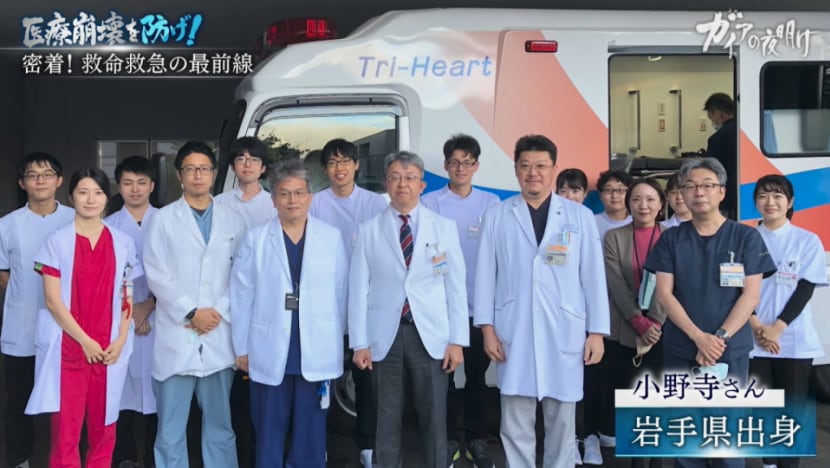Gaia Series 54 : Prevent the collapse of healthcare!
This week’s episode delves into the challenges faced by emergency medical services in Japan, highlighting the relentless efforts of healthcare professionals and the impact of work reforms on their practices.


This audio is generated by an AI tool.
This week’s episode explores the vital role of Japan's emergency medical services, showcasing the heroic efforts and innovative solutions amid a healthcare crisis.
In the latest episode of "Japan Hour: Dawn of Gaia," viewers are taken on a compelling journey through the front lines of Japan's emergency medical services. The episode, which aired recently, paints a vivid picture of the immense challenges and remarkable dedication of healthcare professionals striving to provide life-saving care amid a national healthcare crisis.
The episode opens with a poetic reflection on the resilience of the Earth, setting the tone for a narrative centred on hope and renewal. As the documentary shifts to Kawagoe City, Saitama, the focus narrows to a private emergency clinic gaining attention for its critical role in the community. The Kawagoe Emergency Clinic, led by Director Jun Uehara, becomes a microcosm of the broader issues plaguing Japan's healthcare system.
One of the episode's early highlights features the arrival of a man in his forties, injured in a truck accident. "Are you in pain?" a nurse asks as the man clutches his left side. Dr Uehara quickly assesses the situation, noting the man's numb hands and feet, indicative of possible neurological issues. The urgency and precision in his actions underscore the high stakes of emergency medical care.
Dr Uehara's dedication is palpable as he navigates a relentless stream of emergencies. At midnight, a man in his sixties arrives with a head injury. Despite the limited external injuries, the need for swift decision-making is critical. It is then revealed that Dr Uehara managed only three and a half hours of sleep that night, highlighting the grueling demands placed on medical professionals.
The strain on resources becomes evident as the documentary sheds light on the clinic's staffing challenges. "We don't have enough doctors," Dr Uehara laments, emphasising the dire need for more personnel as the clinic deals with 40 outpatients and four to five emergency cases each night. “If we don't have enough manpower we will just have to refuse patients,” he says resignedly.
The episode transitions to Fukushima Medical University Hospital, the only advanced emergency medical centre in the prefecture, where staff grapple with similar issues.
With 21 intensive care beds and 17 emergency medicine physicians, the hospital is a crucial lifeline for critical patients. The introduction of limits on overtime for doctors, capped at 960 hours annually, marks a significant shift in working conditions. Yet, the reality of long working hours and high-pressure environments persists.
Deputy Head of the Emergency Department, Makoto Onodera, reflects on the emotional rewards of his work. "When you have a patient in a grave condition who gets better and goes home, you feel a sense of happiness," he shares. This sentiment is echoed by young doctor Moe Sekine, who recounts her inspiration to join the medical field after witnessing the Great East Japan Earthquake.
The episode delves into innovative approaches to alleviate the burden on doctors. Fukushima University Hospital's team-based care model ensures continuity and efficiency. By sharing responsibilities among doctors, nurses, nutritionists, and other specialists, the hospital manages to reduce overtime hours and improve patient care.
Anecdotes from medical professionals enrich the narrative. Dr Kotaro Sorimachi, an emergency doctor, praises the new shift system that separates day and night shifts, allowing for better work-life balance. "It's great to just have a clean finish to the day," he remarks, highlighting the positive impact of these reforms.
However, the challenges are far from over, especially when it comes to emergency departments. There has been an increasing demand for emergency services, particularly among the elderly. In Fukushima City, ambulance dispatches have surged by 50 per cent over the past 15 years. However, many of these cases are people with minor injuries. Dr Onodera expresses his frustration: "If patients without serious conditions take up our beds, we have to refuse critical patients."
Enter Fast Doctor, a startup offering remote online medical consultations. Founded in 2016, it aims to reduce unnecessary ambulance referrals and ease the strain on emergency services by providing medical services online or on calls. Yudai Koide, head of community medical planning at Fast Doctor, emphasises the potential of remote consultations to improve community health systems.
The episode chronicles Koide's efforts to convince facilities for the elderly to adopt this service as almost two-thirds of all patients who call for ambulances are seniors. Despite initial resistance, his persistence pays off as several facilities sign up for the trial. The hybrid system, combining online consultations with home visits by nurses, offers a promising solution to alleviate the pressure on emergency services.
The episode concludes with a hopeful message, underscoring Japan's commitment to maintaining a world-leading health service. As Dr Onodera eloquently states, "Our ultimate goal is that the people in our community can receive medical care with peace of mind." This episode not only highlights the challenges but also celebrates the resilience and ingenuity of Japan's healthcare professionals as they strive for a better tomorrow.












